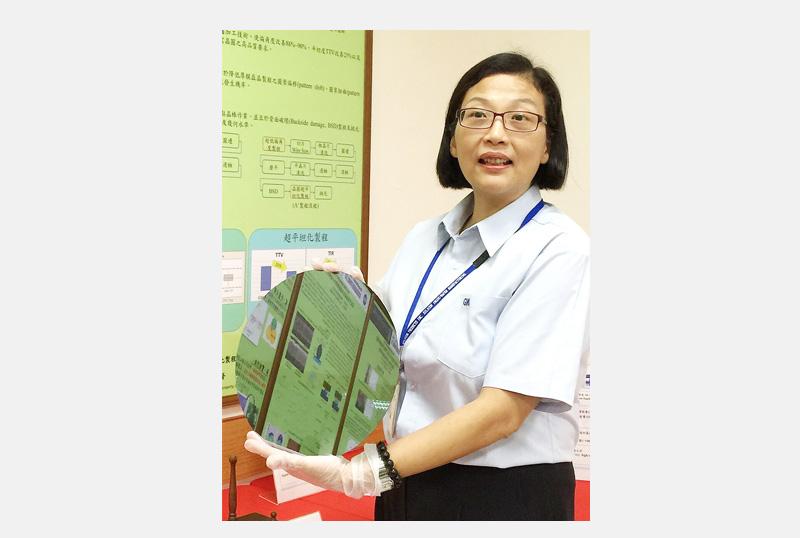GlobalWafers Co (環球晶圓) on Wednesday agreed to acquire German silicon wafer manufacturer Siltronic AG for about 3.75 billion euros (US$4.53 billion), yet another deal in a record year for the global semiconductor industry.
GlobalWafers is to pay 125 euros a share, a 10 percent premium to Siltronic’s closing price on Nov. 27, the day before public disclosure of acquisition talks, the companies said in a statement.
The two companies on Monday last week said they were in discussions.

Photo: Hung Yu-fang, Taipei Times
GlobalWafers has promised not to lay off employees or close any Siltronic site in Germany before the end of 2024, chairwoman and chief executive officer Doris Hsu (徐秀蘭) said yesterday.
The two companies have 20 factories in 10 countries, she added.
“Siltronic can help bolster GlobalWafers’ capability in 5G, power and Internet of Things,” Hsu said in an interview, adding that the deal would help GlobalWafers accelerate the development of more advanced, compound-based semiconductor technology.
The companies said they expect the deal to be completed in the second half of next year.
Hsu said that GlobalWafers is confident the deal would pass regulatory reviews.
The combined company would be the world’s largest silicon wafer maker by revenue, with a market share of 32 to 35 percent, Fubon Securities Investment Services Co (富邦投顧) analyst Richard Hsia (夏武正) said.
The proposed deal would be GlobalWafers’ largest ever, and one of the biggest in the chip industry this year, as companies look beyond the COVID-19 pandemic to a return to normal business.
The offer would also add to a growing number of semiconductor deals this year, which is set to break the high-water mark for chip acquisitions reached in 2016, when US$122 billion in transactions were struck.
The largest deal of 2016 was Softbank Group Corp’s US$32 billion purchase of Arm Ltd.
Headquartered in Munich, Siltronic is a leading manufacturer of silicon wafers used in products such as smartphones, computers, navigation and digital displays.
The firm, which has production sites and offices in Germany, the US and other advanced manufacturing countries, had global revenues of about 1.3 billion euros last year.
GlobalWafers, majority-owned by Sino-American Silicon Products Inc (中美晶), reported revenue of about NT$58 billion (US$2 billion) and operating income of NT$18 billion last year.

Taiwan’s rapidly aging population is fueling a sharp increase in homes occupied solely by elderly people, a trend that is reshaping the nation’s housing market and social fabric, real-estate brokers said yesterday. About 850,000 residences were occupied by elderly people in the first quarter, including 655,000 that housed only one resident, the Ministry of the Interior said. The figures have nearly doubled from a decade earlier, Great Home Realty Co (大家房屋) said, as people aged 65 and older now make up 20.8 percent of the population. “The so-called silver tsunami represents more than just a demographic shift — it could fundamentally redefine the

The US government on Wednesday sanctioned more than two dozen companies in China, Turkey and the United Arab Emirates, including offshoots of a US chip firm, accusing the businesses of providing illicit support to Iran’s military or proxies. The US Department of Commerce included two subsidiaries of US-based chip distributor Arrow Electronics Inc (艾睿電子) on its so-called entity list published on the federal register for facilitating purchases by Iran’s proxies of US tech. Arrow spokesman John Hourigan said that the subsidiaries have been operating in full compliance with US export control regulations and his company is discussing with the US Bureau of

Businesses across the global semiconductor supply chain are bracing themselves for disruptions from an escalating trade war, after China imposed curbs on rare earth mineral exports and the US responded with additional tariffs and restrictions on software sales to the Asian nation. China’s restrictions, the most targeted move yet to limit supplies of rare earth materials, represent the first major attempt by Beijing to exercise long-arm jurisdiction over foreign companies to target the semiconductor industry, threatening to stall the chips powering the artificial intelligence (AI) boom. They prompted US President Donald Trump on Friday to announce that he would impose an additional

China Airlines Ltd (CAL, 中華航空) said it expects peak season effects in the fourth quarter to continue to boost demand for passenger flights and cargo services, after reporting its second-highest-ever September sales on Monday. The carrier said it posted NT$15.88 billion (US$517 million) in consolidated sales last month, trailing only September last year’s NT$16.01 billion. Last month, CAL generated NT$8.77 billion from its passenger flights and NT$5.37 billion from cargo services, it said. In the first nine months of this year, the carrier posted NT$154.93 billion in cumulative sales, up 2.62 percent from a year earlier, marking the second-highest level for the January-September